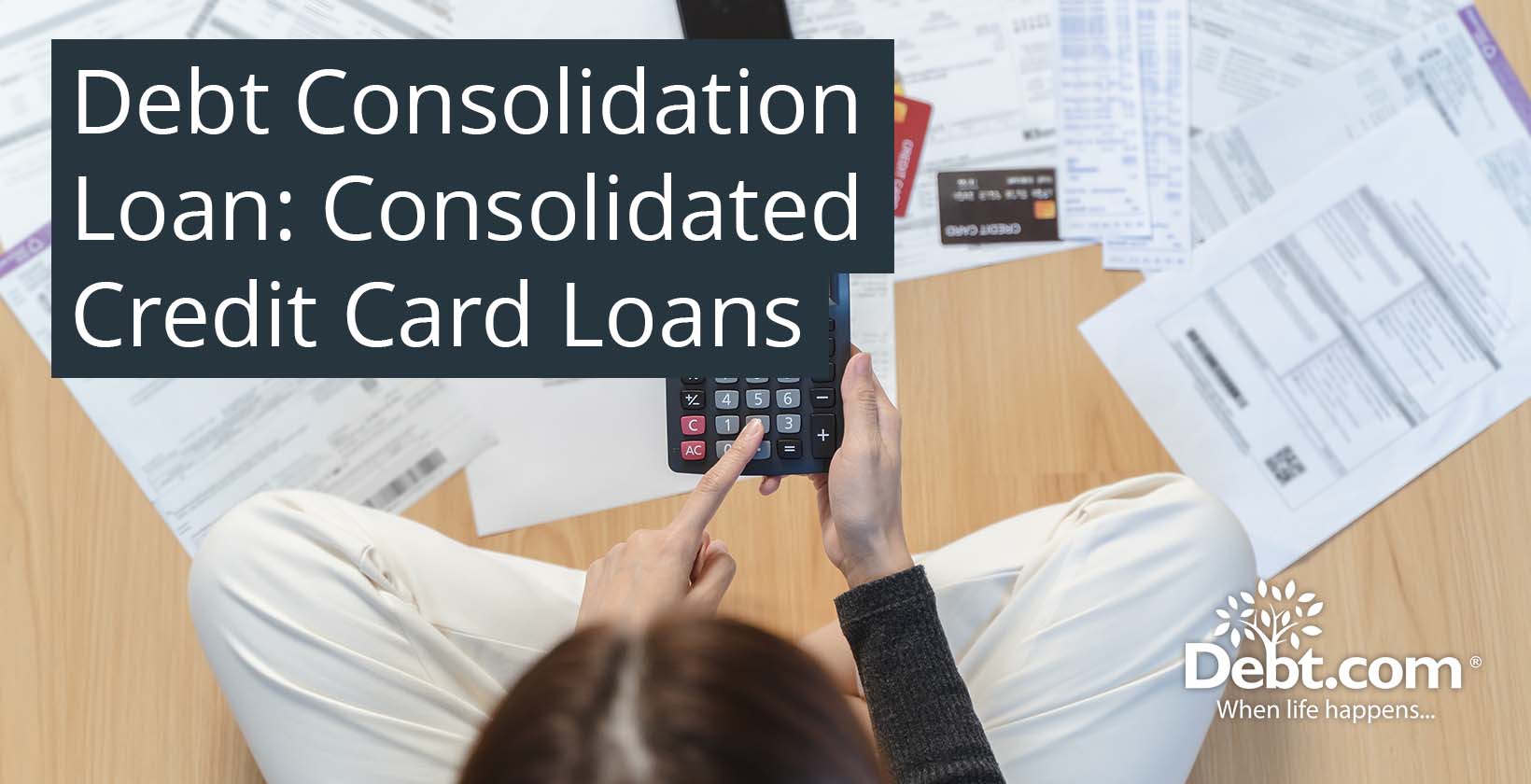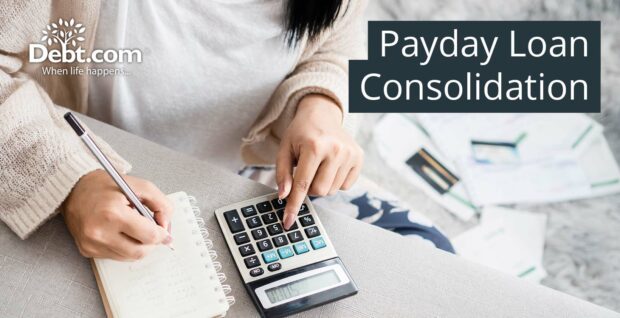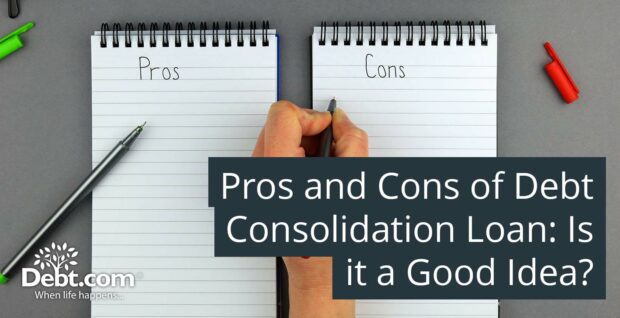
You’re not alone if you’re overwhelmed by a mountain of bills, struggling to keep up with minimum payments, watching interest charges pile up, and trying to juggle multiple due dates. The Federal Reserve recently released its latest data revealing Americans collectively hold over $1.2 trillion in credit card debt.
With inflation still driving up costs of everyday items, many Americans have no choice but charge their credit cards to make ends meet. Fortunately, there are ways to get some much-needed relief and streamline your finances.
Debt consolidation is one of the most powerful tools available for simplifying finances, reducing interest burdens, and accelerating the process of becoming debt-free.
Below, we’ll cover debt consolidation, how it works, and the types of debt that can be consolidated. We’ll also discuss considerations to determine if it is the right solution for you.
Table of Contents
What is debt consolidation?
Debt consolidation is the process of combining multiple debts into a single loan with one monthly payment. This strategy aims to reduce the overall interest paid and improve debt management by simplifying repayment. By securing a lower interest rate than existing debts (often credit cards), borrowers can pay off debt faster and save on interest over time.
Lowering interest rates is a primary benefit of debt consolidation, especially if debts like credit card bills have high-interest rates. For example, consolidating three credit card debts at 18%, 20%, and 22% APR into a single loan at 12% APR lowers the overall interest rates significantly. This lower rate can provide substantial relief and free up cash flow.
Consolidating multiple credit card loans into one consolidated loan is shown in the table below.
| Credit Card | Principal | Interest Rate | Monthly Payment | Terms (Months) | Bills Paid/Month | Total Interest Paid |
| Card A | $5,000 | 18% | $250 | 24 | 1 | $1,000 |
| Card B | $3,000 | 22% | $150 | 24 | 1 | $720 |
| Card C | $2,500 | 15% | $125 | 24 | 1 | $500 |
| Total | $10,500 | $525 | $2,220 |
What are the different types of debt consolidation?
Debt consolidation can come in a few different forms, and different financial situations may require different consolidation methods. We recommend three: personal debt consolidation loans, credit card balance transfers, and debt management plans (aka debt consolidation program). Other options are home equity loans, HELOCs, or cash-out refinances, but these trade unsecured loans for secured loans so they should be avoided.
Debt Consolidation Loan
A debt consolidation loan is a type of personal loan that you use to pay off your existing debts, meaning you’ll no longer owe money to multiple creditors. You then make a single monthly payment to pay off the new loan. The interest rates on debt consolidation loans typically range from about 6% to 36%, with an average annual percentage rate of about 22.59%. These loans vary from $1,000 to $100,000, with repayment terms spanning 24 to 84 months. This is best for those with multiple high-interest debts, have a stable income, and those with fair to good credit. Credit scores between 720 and 850 increase the chances of approval and reduce interest payments.
Credit card balance transfer
A balance transfer credit card is a type of credit card that allows you to transfer existing debt from one or more credit cards to a new card. Most of these cards offer a low or 0% APR introductory period. They are best for those with good credit, stable income, multiple high-interest credit cards, and for those who can reasonably pay off their debt before the introductory low APR period ends.
Debt management program
A debt management program (DMP) offers a structured approach to debt repayment, facilitated by a nonprofit consumer credit counseling service. Through the DMP, your debts are consolidated into a single monthly payment, and the agency negotiates with your creditors to potentially lower or eliminate interest rates and waive fees. This allows you to focus on paying down the principal balance, rather than being overwhelmed by accruing interest charges. It’s important to note that unlike debt consolidation loans or balance transfer cards, with a DMP you continue to owe your original creditors, albeit under a new repayment plan.
How does a debt consolidation loan work?
Debt consolidation works by taking out a new loan to pay off all your existing debts. Instead of juggling multiple payments to different creditors with varying interest rates and due dates, you’ll have just one monthly payment to a single lender. Here’s a breakdown of the process:
Step 1: Assess your debt
Gather information about all the debts you want to consolidate, including the outstanding balance, interest rate, and minimum monthly payment for each.
Step 2: Explore consolidation options
Research different debt consolidation loans. Compare interest rates, fees, and loan terms from various lenders.
Step 3: Choose a consolidation loan
Select the loan option that best suits your needs and financial situation. Consider factors like the interest rate, the loan term (how long you have to repay), and any associated fees.
Step 4: Apply
Complete the loan application process with your chosen lender. They will review your credit history and financial information to determine your eligibility.
Step 5: Consolidate Your Debts
If approved, the lender will typically use the new loan to pay off your existing debts directly. This simplifies your financial obligations into one loan.
Step 6: Make Regular Payments
Make consistent, on-time payments according to the agreed-upon terms. This helps you avoid late fees and further damage to your credit score.
What type of debt can I consolidate?
You can consolidate many types of debt, but it’s important to understand the differences. Also each type may get consolidated in a different way.
Unsecured debts
Unsecured debt, or debt that isn’t backed by collateral, is the most common type of consolidation. These debts include things like credit cards, medical bills, personal loans, and payday loans.
Secured debts
Secured debt like mortgages and car loans, are a bit different. These loans are tied to something the lender can take if you don’t pay (your house or car). Consolidating these usually means refinancing—getting a new loan to replace the old one, possibly with better terms. While this type of debt can be consolidated, be careful. Missing payments can mean losing your house or car.
Student loans
Student loans can also be consolidated, but federal and private loans have different rules. Federal student loan consolidation is done through the government and has specific programs. Private student loans are consolidated through private lenders, like other types of debt. It’s a good idea to research the pros and cons before consolidating student loans, as you might lose some benefits.
Tax debt
Tax debt is consolidated by working directly with the IRS or state tax authorities. This usually involves setting up a payment plan. Tax debt consolidation can be tricky, so getting advice from a tax professional is recommended. So, while many debts can be consolidated, it’s essential to consider your specific situation and the type of debt you have before deciding if it’s the right move for you.
When to consolidate credit card loans?
Debt consolidation can be a smart move when you’re facing high-interest, substantial credit card debt and have a stable income that allows you to comfortably manage payments. Consolidation loans and balance transfer credit cards are also best if you have a good credit score because you’ll get the most favorable terms. The key is to ensure that consolidating will genuinely improve your financial outlook and prevent you from accumulating further debt.
If you discover this is not a viable option, consider alternatives like debt management programs, or debt settlement. Our experts at debt.com can help you determine which solution is the best fit for your situation, so call today (855) 272-3705.
What are the requirements to apply for a debt consolidation loan?
To get a debt consolidation loan, you’ll usually need to have a good credit score. This is because your goal is to get a lower interest rate than what you are currently paying. If you don’t have good credit, you may not get a favorable rate or qualify at all. You’ll also need to show you have a steady income so lenders know you can pay back the loan. This means providing proof of income like pay stubs or tax returns. Lenders will check for any warning signs, like lots of late payments or past bankruptcies, which can make it harder to get approved. Finally, you’ll typically need to be a U.S. citizen or permanent resident. Meeting these requirements makes it much more likely you’ll get the loan and good terms.
What are the best personal loans for debt consolidation?
There’s no single “best” debt consolidation loan because the ideal option depends on your unique financial situation. Factors like your credit score, the amount you need to borrow, and lender policies all play a role in determining the interest rate and terms you’ll qualify for. However, the core principle remains the same: the best debt consolidation loan is the one that simplifies your finances and saves you money. This primarily means securing an interest rate significantly lower than the average rate you’re currently paying. A lower rate translates to lower monthly payments, a reduced overall debt burden, and significant interest savings over the life of the loan.
How to calculate debt consolidation loan payments?
A debt consolidation calculator helps you see if combining your debts makes financial sense. You enter your current debt details (balances, interest rates, payments) and the potential new loan’s details (amount, interest rate). The calculator then compares your current situation to the projected outcome if you consolidate. This helps you see if consolidation could mean simpler payments, lower interest, smaller monthly bills, or faster payoff. Note that the calculator’s results are just estimates.
Does debt consolidation hurt your credit score?
No, debt consolidation doesn’t generally hurt your credit score. While applying for the consolidation loan might slightly lower your score at first, having your debts consolidated often helps your score in the long run. If you use the loan to pay off credit card debt, for example, it can lower your credit utilization ratio (how much of your available credit you’re using), which is good for your score. Consolidating also makes it easier to keep up with payments, and on-time payments are great for your credit. So, while there might be a small dip initially, debt consolidation often helps your credit score in the long run if you manage it well.
One thing to watch out for: closing old credit card accounts after consolidating can sometimes hurt your score since it may decrease your credit age and lowers your credit utilization ratio. If possible, consider keeping these accounts open (this may not be an option for those on a debt management plan).
What is the difference between debt consolidation and debt settlement?
Debt consolidation and debt settlement are two different approaches to debt management. With consolidation, you still owe the full amount of your debt, but it combines your existing debts into one new loan, often with a lower interest rate, making payments easier. Debt consolidation usually has a neutral or positive affect on your credit. Debt settlement, on the other hand, involves negotiating with your lenders to pay less than you actually owe, but it can severely damage your credit.
What are the Best Interest Rates for Debt Relief Loan?
The best interest rates for debt relief loans are shown in the table below.
| Financial Institutions | Interest Rate | Application Requirements |
|---|---|---|
Happy Money | 11.72% to 17.99% | Minimum credit score: 640 Minimum credit history: Three years Maximum debt-to-income ratio: 50% |
Best Egg | 8.99% to 35.99% | Minimum credit score: Does not disclose Minimum annual income: Does not disclose Does not allow co-signer |
LightStream | 7.49% to 25.49% | Applicants should have several years of credit history Minimum credit score: 660 Can’t prequalify |
SoFi | 8.99% to 29.99% | Minimum credit score required: 650 Minimum annual income: $45,000 Co-signers not permitted |
Upgrade | 8.49% to 35.99% | Minimum credit score: 580 No minimum income requirement Allows co-applicants |
Universal Credit | 11.69% to 35.99% | Minimum credit score: 580 Minimum income requirement: Does not disclose Doesn’t allow co-signers or co-borrowers |
Achieve | 8.99% to 35.99% | Minimum credit score: 620 Minimum annual income: $21,500 Allows co-signers and co-applicants |
Discover | 7.99% to 24.99% | Minimum credit score: 660 Minimum household income: $25,000 Doesn’t allow co-signers or co-borrowers |
Lending Club | 8.98% to 35.99% | Minimum credit score: 600 Minimum credit history: Three years Allows co-applicants |
The main criteria for selecting a bank or financial institution for a debt consolidation loan are the interest rate, eligibility, and acceptability criteria. The cheapest debt consolidation loan has the lowest interest rate among the options provided. Discover offers interest rates ranging from 7.99% to 24.99%, the highest of any institution. A minimum credit score of 660 and a minimum income of $25,000 give it greater accessibility to debtors with good credit and incomes. The cheapest consolidation loan is obtained from Discover.












